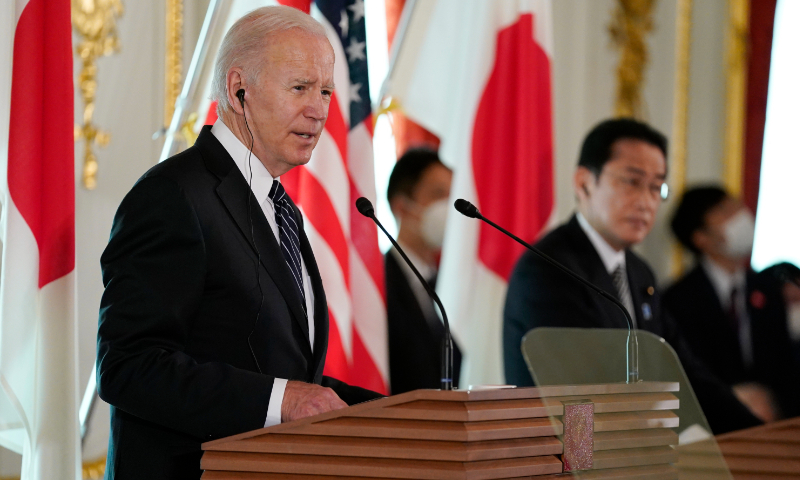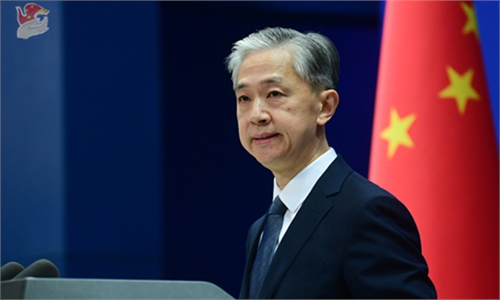US flip-flops on ‘Taiwan independence’ wording a big joke, lays bare anxiety over incapacity not matching ambition: experts

US President Joe Biden speaks during a news conference with Japanese Prime Minister Fumio Kishida at Akasaka Palace on May 23, 2022, in Tokyo. Photo: VCG
The back and forth of the US State Department in its fact sheet over whether or not it supports "Taiwan independence" is not only akin to a "joke," but also lays bare the US' anxiety over the Taiwan question deriving from its incapacity of matching its action with ambition in face of China, experts said.
The US State Department has changed its fact sheet again over the island of Taiwan, adding back the statement "We do not support Taiwan independence," dated May 28 on the US State Department website, after it removed the line less than a month earlier.
It shows that the Biden administration does not desire a substantial reversal in relations with China when it comes to the Taiwan question. And the previous deletion shows the president's resignation to the US Congress' pressure, and putting it back signals the Biden administration's return to rationality in seeking a basic common ground with China, Li Haidong, a professor from the Institute of International Relations at the China Foreign Affairs University in Beijing, told the Global Times on Friday.
The US' frequent changing in its wording about Taiwan island shows its obvious anxiety and dilemma in its Taiwan policy, said Shen Yi, a professor at the School of International Relations and Public Affairs of Fudan University.
Chinese State Councilor and Foreign Minister Wang Yi said at a symposium on "Dr. Kissinger and China-US Relations" that the current atmosphere of China-US relations is highly abnormal, and the great anxiety on the US side is entirely unnecessary.
Washington is clear that it lacks the policy tools when handling the island of Taiwan without provoking a military conflict with the Chinese mainland, while at the same time, it is also desperate to use wording changes to earn points in its China policy. However embarrassing this is, it cannot be done without worries it could lead to the mainland's strong retaliation, Shen told the Global Time on Friday.
Observers noted that Washington's flip-flops over wording about Taiwan island are nothing but a joke, where it lacks the capability to match its ambition and possible consequential actions over the matter, which is also very confusing for others.
It is safe to say that Biden and his team have realized the importance of handling Taiwan-related issues responsibly, despite huge pressure from domestic political forces. By getting back on track in words, Biden aspires to maintain flexible wiggle room with China, Li noted.
Chinese Foreign Ministry spokesperson Zhao Lijian warned during a routine press conference on May 10, while responding to a question concerning the previous change in the fact sheet, that it was "a trick to obscure and hollow out the one-China principle. Such political manipulation of the Taiwan question and the attempt to change the status quo across the Taiwan Straits will hurt the US itself."
Biden claimed on May 23, during his visit to Japan, that the US would intervene militarily were the Chinese mainland to take the island of Taiwan by force, while soon after, on May 26, his Secretary of State, Antony Blinken, clarified by reiterating that Washington's policy on the island of Taiwan had not changed and that the US will continue to pursue its "one China policy" guided by the Taiwan Relations Act, the three joint communiqués, and the six assurances, walking back Biden's commitment to the island.
Observers said that the more tricks the US attempts to play with the "Taiwan card," the few it actually has left in its hand to really contain China. The US' risky flip-flops over the issue would only increasingly label itself as treacherous and unreliable, and lure Taiwan's secessionist Democratic Progressive Party to jump higher and fall harder.



